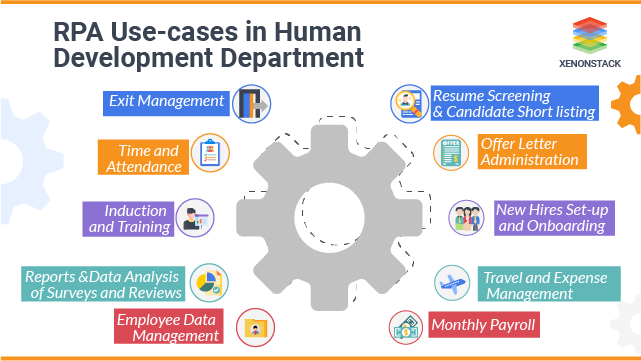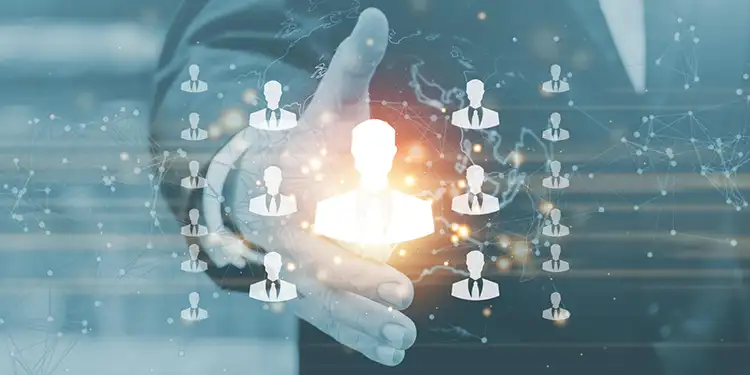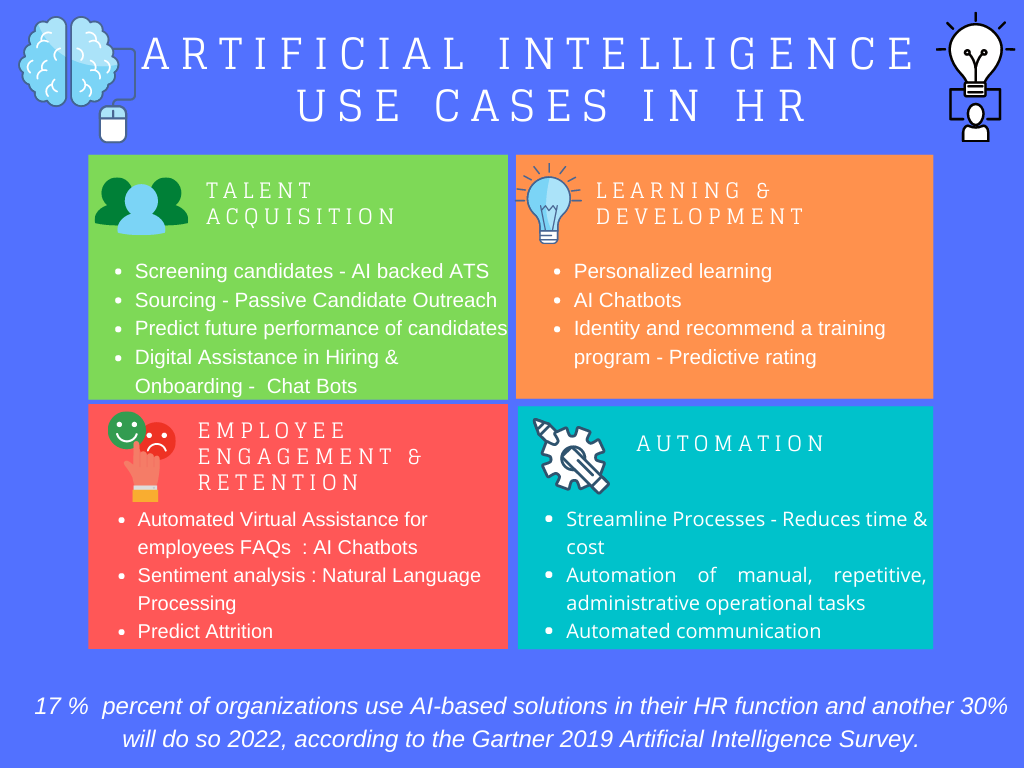
Ever wondered how technology is revolutionizing the world of HR? Well, look no further because in this article, we’re diving into the exciting realm of RPA and AI in HR and how they are transforming talent acquisition and employee engagement. These cutting-edge technologies are not only streamlining HR processes but also enhancing the overall employee experience, making it a win-win situation for both employers and employees.
From automating repetitive tasks to leveraging data-driven insights, RPA (Robotic Process Automation) and AI (Artificial Intelligence) are paving the way for a more efficient and effective HR function. With RPA, mundane administrative tasks like data entry and document processing can be delegated to software robots, freeing up HR professionals to focus on strategic initiatives and more meaningful interactions with employees. AI, on the other hand, enables HR teams to leverage advanced analytics and machine learning algorithms to make data-driven decisions, predict employee behavior, and personalize experiences. So, let’s dive deeper into how RPA and AI are transforming talent acquisition and employee engagement, and how organizations can harness their power to stay ahead in the ever-evolving world of HR.
RPA and AI are revolutionizing HR by enhancing talent acquisition and improving employee engagement. With the power of automation and artificial intelligence, HR departments can streamline recruitment processes, identify top candidates, and improve overall hiring efficiency. Additionally, AI-driven tools can analyze employee data to personalize engagement strategies, boost morale, and increase productivity. By leveraging RPA and AI in HR, organizations can optimize their talent acquisition efforts and create a more engaged workforce.

RPA and AI in HR: Improving Talent Acquisition and Employee Engagement
The integration of Robotic Process Automation (RPA) and Artificial Intelligence (AI) in HR has revolutionized talent acquisition and employee engagement practices. These technological advancements have streamlined HR processes, enhanced decision-making, and improved overall efficiency in managing human resources. By leveraging RPA and AI, organizations can optimize talent acquisition strategies, attract top talent, and enhance employee engagement for better organizational outcomes.
Streamlining Talent Acquisition
RPA and AI have transformed the way organizations attract and recruit talent. Automation of repetitive tasks such as resume screening, candidate shortlisting, and scheduling interviews has significantly reduced the time and effort required for these processes. With RPA, HR professionals can automate mundane tasks and focus on more strategic activities, such as evaluating candidates’ skills and cultural fit.
AI-powered chatbots and virtual assistants have also become crucial tools in talent acquisition. These intelligent systems can engage with prospective candidates, answer their queries, and provide personalized information about job opportunities and company culture. By leveraging AI, organizations can create a seamless and interactive recruitment experience, attracting top talent and enhancing their employer brand.
When it comes to talent acquisition, data-driven decision-making is essential. RPA and AI enable HR professionals to analyze vast amounts of data, including candidate profiles, job market trends, and historical recruitment data. By leveraging this data, organizations can make informed decisions about candidate selection, identify skills gaps, and develop targeted recruitment strategies.
Benefits of RPA and AI in Talent Acquisition
The integration of RPA and AI in talent acquisition offers numerous benefits. Firstly, it accelerates the recruitment process, reducing time-to-hire and ensuring organizations don’t miss out on top talent. Secondly, it enhances the quality of hires by automating candidate screening and shortlisting, ensuring only the most qualified candidates are considered. Additionally, RPA and AI enable HR professionals to gain valuable insights from data analytics, leading to data-driven decision-making and improved recruitment strategies.
Furthermore, RPA and AI technologies provide a personalized candidate experience. Chatbots and virtual assistants can engage with candidates, answer their queries, and guide them through the application process. This personalized interaction enhances candidates’ engagement and improves their perception of the organization.

Enhancing Employee Engagement
RPA and AI have also revolutionized employee engagement practices, ensuring a positive employee experience and increased productivity. Intelligent HR systems powered by AI can provide personalized onboarding experiences, enabling new employees to quickly familiarize themselves with the company’s culture, policies, and procedures. This seamless onboarding process sets the foundation for long-term employee engagement and retention.
AI-powered performance management systems have also transformed traditional performance evaluation processes. These systems can analyze employee performance data, identify patterns, and provide real-time feedback and recommendations for improvement. By leveraging AI, organizations can ensure fair and objective performance evaluations, fostering a culture of continuous improvement and employee development.
In addition, RPA and AI can automate routine HR tasks, such as leave management, benefits enrollment, and employee data updates. By freeing up HR professionals from administrative tasks, organizations can empower them to focus on strategic initiatives that drive employee engagement, such as designing employee recognition programs, implementing professional development opportunities, and fostering a positive work environment.
Benefits of RPA and AI in Employee Engagement
The integration of RPA and AI in employee engagement offers numerous benefits. Firstly, it improves the overall employee experience by providing personalized onboarding and performance management processes. Secondly, it enhances communication and collaboration through AI-powered chatbots and virtual assistants, ensuring employees have easy access to information and resources. Additionally, RPA and AI technologies automate administrative tasks, reducing the burden on HR professionals and enabling them to focus on more strategic initiatives that drive employee engagement.
Furthermore, RPA and AI enable organizations to gain valuable insights from employee data. By analyzing data related to employee engagement, satisfaction, and productivity, organizations can identify areas of improvement and implement targeted initiatives to enhance employee well-being and job satisfaction.
Embracing the Future of HR
RPA and AI have become integral components of modern HR practices, revolutionizing talent acquisition and employee engagement. Organizations that embrace these technologies can gain a competitive advantage by attracting top talent, optimizing HR processes, and fostering a positive work environment. With RPA and AI, HR professionals can focus on strategic initiatives, enhance decision-making, and create a workplace that nurtures employee growth and engagement.
In conclusion, the integration of RPA and AI in HR has transformed talent acquisition and employee engagement practices. These technologies streamline talent acquisition processes, enhance decision-making, and improve overall efficiency. By leveraging RPA and AI, organizations can attract top talent, optimize HR processes, and create a positive employee experience. Embracing the future of HR means embracing RPA and AI as essential tools for success in the ever-evolving workplace.
Key Takeaways
- RPA and AI are transforming HR processes in talent acquisition and employee engagement.
- Automation through RPA streamlines repetitive tasks, allowing HR professionals to focus on strategic activities.
- AI-powered tools enhance talent acquisition by analyzing resumes and identifying top candidates.
- AI can also improve employee engagement through personalized learning and development programs.
- Combining RPA and AI in HR leads to increased efficiency, improved decision-making, and better employee experiences.
Frequently Asked Questions

What is the role of RPA in talent acquisition and employee engagement?
RPA, or Robotic Process Automation, plays a crucial role in talent acquisition and employee engagement by automating repetitive tasks and streamlining HR processes. With RPA, HR professionals can automate resume screening, candidate sourcing, and interview scheduling, allowing them to focus on more strategic aspects of talent acquisition. This not only saves time but also ensures a more efficient and unbiased hiring process.
Moreover, RPA can enhance employee engagement by automating onboarding processes, such as generating offer letters, setting up email accounts, and assigning training modules. By eliminating manual tasks, HR teams can provide a seamless onboarding experience, enabling new hires to feel valued and engaged from day one.
How does AI contribute to talent acquisition?
AI, or Artificial Intelligence, revolutionizes talent acquisition by leveraging advanced algorithms and machine learning models to analyze vast amounts of data. AI-powered tools can screen resumes, assess candidate qualifications, and predict candidate fit for specific roles. This not only speeds up the recruitment process but also improves the quality of hires by identifying the most suitable candidates.
Additionally, AI can enhance candidate engagement through chatbots and virtual assistants. These AI-driven tools can provide personalized responses, answer frequently asked questions, and guide candidates through the application process. By offering a seamless and interactive experience, AI helps attract and retain top talent.
What are the benefits of using RPA and AI in HR?
Implementing RPA and AI in HR brings numerous benefits. Firstly, it improves efficiency by automating manual tasks, freeing up HR professionals to focus on more strategic activities. This not only saves time but also reduces the chances of errors and inconsistencies.
Secondly, RPA and AI enhance the accuracy and objectivity of talent acquisition processes. AI-powered tools can eliminate bias in resume screening and candidate evaluation, ensuring a fair and merit-based hiring process.
Lastly, RPA and AI improve employee engagement by providing a seamless and personalized experience. Automation simplifies onboarding processes, while AI-driven chatbots and virtual assistants offer immediate support and guidance to employees, fostering a positive and engaging work environment.
What are the potential challenges of implementing RPA and AI in HR?
While the benefits of RPA and AI in HR are significant, there are some potential challenges to consider. One challenge is the initial investment required for implementing these technologies. RPA and AI solutions often require upfront costs for software licenses, infrastructure setup, and employee training.
Another challenge is the resistance to change from employees. Some employees may feel apprehensive about automation taking over their tasks or fear job losses. Clear communication and change management strategies are essential to address these concerns and ensure a smooth transition.
How can organizations successfully implement RPA and AI in HR?
Successful implementation of RPA and AI in HR begins with careful planning and evaluation of organizational needs. Organizations should identify specific HR processes that can benefit from automation and AI-driven insights. It is crucial to involve HR professionals in the decision-making process and provide them with the necessary training and support to embrace these technologies.
Additionally, organizations should collaborate with IT departments and technology vendors to ensure smooth integration and data security. Regular monitoring and evaluation of the implemented solutions are also necessary to identify areas for improvement and make necessary adjustments to optimize the benefits of RPA and AI in HR.

Final Thoughts: RPA and AI Revolutionizing HR for Talent Acquisition and Employee Engagement
In this fast-paced digital age, the integration of Robotic Process Automation (RPA) and Artificial Intelligence (AI) in HR has proven to be a game-changer for talent acquisition and employee engagement. As we conclude our exploration of this exciting topic, it is evident that these technological advancements are reshaping the HR landscape, enabling organizations to streamline their processes, enhance decision-making, and foster a more engaged and productive workforce.
By leveraging RPA and AI, HR departments are now able to automate repetitive administrative tasks, freeing up valuable time for HR professionals to focus on strategic initiatives and building meaningful connections with employees. This automation not only improves operational efficiency but also reduces human error, ensuring accurate and consistent outcomes. The integration of AI-powered chatbots provides instant support to candidates and employees, enhancing the overall experience and creating a positive impression of the organization.
Furthermore, RPA and AI enable HR teams to make data-driven decisions by analyzing vast amounts of information and identifying patterns and trends. This empowers organizations to develop targeted talent acquisition strategies, identify skill gaps, and optimize employee engagement initiatives. The ability to harness the power of predictive analytics and machine learning allows HR professionals to anticipate future needs, proactively address challenges, and cultivate a culture of continuous improvement.
In conclusion, RPA and AI are revolutionizing the HR landscape, transforming talent acquisition and employee engagement practices. By embracing these technologies, organizations can not only enhance their operational efficiency but also attract and retain top talent, foster a culture of innovation, and drive sustainable growth. As the world continues to evolve, it is imperative for HR professionals to adapt and embrace these advancements to stay ahead of the curve and create a thriving workforce that is ready to conquer the challenges of tomorrow.